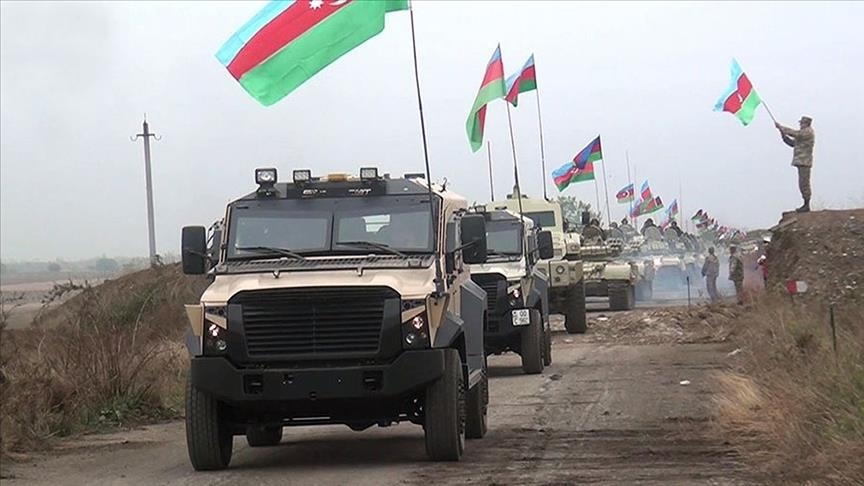
ISTANBUL
According to an expert from Azerbaijan, the liberation of Nagorno-Karabakh from the Armenian occupation provides a greater chance for cooperation, peace, and development in the region.
Vugar Bayramov, the chairman of the Baku-based Center for Economic and Social Development (CESD), said Turkish President Recep Tayyip Erdogan's proposal to form a six-country regional cooperation platform (Turkey, Russia, Iran, Azerbaijan, Georgia and Armenia) would prove beneficial in this regard.

"Trilateral negotiations between Russia, Azerbaijan and Armenia are going on, and a working group has also been established," Bayramov told Anadolu Agency on the sidelines of a two-day conference in Istanbul. "In their first meeting held recently in Moscow, they discussed a corridor from mainland Azerbaijan to Nakhchivan."
Last week, Istanbul hosted "Turkey, Pakistan and Central Asia: Partnership for Peace," a conference organized by Turkey's Center for Diplomatic Affairs and Political Studies in partnership with Pakistan's Lahore Center for Peace Research.
The Azerbaijani expert said: "Russia, Azerbaijan and Armenia have discussed opening up transportation and logistics and connectivity with Nakhchivan, which could result in more non-oil exports from Azerbaijan."
Azerbaijan liberated its lands in Nagorno-Karabakh, which Armenia occupied in South Caucasus for nearly three decades, late last year.
Ankara supported Baku throughout the 44-day-long battle, which ended on Nov. 10 with a Moscow-brokered cease-fire.
The opening of a transit corridor connecting Azerbaijan with its Nakhchivan enclave provides new opportunities for the region and gives Turkey direct access to the Caspian Sea.
Bayramov said the corridor would allow more exports from the Turkish side "as it will provide a chance to Turkish companies to export directly into Central Asian, and Asian markets."
Easier transportation, access to EU market
The presidents of Turkey and Russia recently discussed regional matters, including Karabakh, in a telephone call.
Erdogan suggested to Vladimir Putin that experts from the two countries and Azerbaijan could hold talks on how to more efficiently re-establish roads and rail transportation lines in Upper Karabakh under an agreement signed Jan. 11.
"We believe that the post-war period will make all countries better," said Bayramov, who heads the CESD.
Azerbaijani cooperation agreements with Turkmenistan and Kazakhstan, he added, make transportation and cargo supplies "easier" through the Caspian Sea.
"This is for Central Asia. A new corridor. A new opportunity to export efficiently to Turkic markets, and also to have direct access to European markets," he said. "It is also a step towards Turkic integration."
Five Turkic nations Kazakhstan, Kyrgyzstan, Turkmenistan, Uzbekistan, and Tajikistan form Central Asia.
Azerbaijan is not a part of the central Asian region but is ethnically Turkic and enjoys strong ties with Turkey.
'Turkey-Pak-Azerbaijan cooperation good for peace'
On trilateral cooperation between Azerbaijan, Turkey and Pakistan, Bayramov said joint projects would pave the way for further collaboration.
Turkish companies are investing in Nagorno-Karabakh and "we also expect Pakistani companies to engage in resurrection stage of the liberated territories," he added.
He said for Azerbaijan, Turkey is the second major trade partner after Italy and the top trading partner in non-oil exports and imports.
"Economic relations between Pakistan and Azerbaijan have also been increasing in the last couple of years and we expect more trade turnover in the future. Such cooperation will result in more joint projects and a rise in imports and exports."
"Cooperation between these countries is strategic in nature," Bayramov said. "This cooperation is important to promote regional peace."
Turkey-Pak relations
Turkey and Pakistan lots of potential to increase economic relations, "but there is a need to do a lot of work," said Salman Shah, an adviser on financial affairs to the chief minister of Pakistan's Punjab province.
The bilateral trade volume between Turkey and Pakistan is around $800 million, and the two countries are working to increase it.
Asghar Zaidi, the vice-chancellor of the Government College University Lahore, said Pakistan, Turkey and Azerbaijan have "great prospects" of partnership in higher education.
"We have a bulge of the youth population, and it will benefit all three countries if we could form a union of universities that can lead better education, research and investment in science and technology," Zaidi told Anadolu Agency. "It is high time that the universities come together."
Anadolu Agency website contains only a portion of the news stories offered to subscribers in the AA News Broadcasting System (HAS), and in summarized form. Please contact us for subscription options.







